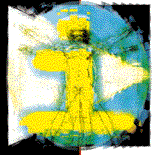 |
Student Computer Art Society Server Projects: The Violence of the Information |
|
|
||
International symposium "THE VIOLENCE OF INFORMATION" |
||
|
||
| Information in global and local networks, multimedia installations and all other modern media and communications attacks us in our everyday life: at home, at work, and in all other spheres of creativity. It becomes a huge force and starts to control us, to penetrate into us without care about our permission or will. Sometimes we don't like to know some information but it just attacks us because it wants to be known and uses all possible ways to do that. | ||
Aim of the project is to explore and discuss the different types of information violence and arrogance in the sphere of contemporary culture. |
||
| 1.
Information violence in global networks.
Global networks and Internet - more or less freedom? New
information monopolists, new standards for quality of
information. Attempts of influencing on arts, education
in arts, computer arts. 2. Information violence in multimedia installations. Video and audio conferencing, interactive TV installations. New media - more or less culture?. How they influence on art creation and art promotion, and art presentation? 3. The information competition between the big information providers and the attempt to conquer our minds and modulate our day life. 4. Globalization of the culture in Europe and cultural survival of small cultural groups and small nations. Minorities in the global cultural space - violation of the globalization process. 5. Info-rubbish in the culture and art. Insignificant information in the global networks and its influence on the culture. |
||
| 1.
Artists and art-working students 2. Multimedia experts. 3. Computer art creators. 4. Journalists working with modern communications and multimedia. |
||
| 1.
Symposium called 'The Violence of information' (lectures,
discussions) with participants from about 8-10 countries
from Europe. (October, 1998) 2. Four workshops called:
3. Interactive exhibition - "Cultural codes of the information" 4. Additional events - the X edition of the International Computer Art Forum Computer Space '98. The symposium will take its place in the frames of a traditional event - Computer Space forum. On one hand, authors and participants will have larger audience, and, on the other hand, participants in the symposium will have a chance to see some of the best computer art achievements from all over the world. 5. Social program. A number of social events will run aiming to present the main art creation places, clubs, labs and galleries in Bulgaria. Also, a number of meetings with Bulgarian artists and institutions will be offered. |
||
| Computer Space 98 is organized by Student Computer
Art Society [SCAS]. Computer and Electronic Music Section
is organized by DS Music. The X edition of the Forum is realized in cooperation with the European Cultural Foundation, Committee for Youth, Physical Education and Sport of Council of Ministers, National Palace of Culture, Expo Advertising, Evrika Foundation, and with the support of Soros Center for the Arts, Internet Society - Bulgaria®, Goethe-Institut Sofia, Bulgarian National Committee of ECF, Ministry of Education and Science, Student House - Sofia, British Council, ICN Ltd., Top Team Co., New Technik Pbl., Musical Cable Channel TV, Student CAD Association and Computer Art Center. The Violence of Information symposium is organized by SCAS with the support of the European Cultural Foundation. |
||
|
||
